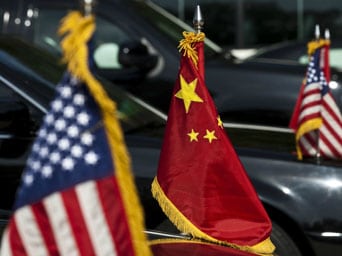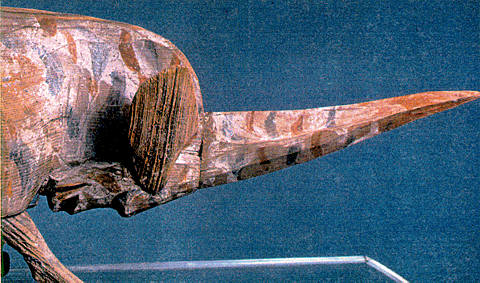
Unlike robots, people can still be made by unskilled labour!
by Jack JC
I normally try to avoid stepping in fields where bulls have wandered. Too often you find yourself scraping your boots clean from the naturally occurring fertilizer. I would never have reviewed this article unless I was pointed to it. I found the content so odious (or was that odoriferous?) that it has prompted me to share my own perspective on it with you.
- The top ten unicorns of China policy
Let’s have a butchers at the authors’ top ten unicorns of China policy, one by one.
1) The Self-Fulfilling Prophecy. This is the argument that has the most purchase over our China policy. Treat China like an enemy, the belief goes, and it will become an enemy. Conversely, treat China like a friend and it will become a friend. But three decades of U.S.-China relations should at least cast doubt on this belief. Since the normalization of relations with China the aim of U.S. policy has been to bring China “into the family of nations.” Other than China itself, no nation has done more than the United States to improve the lot of the Chinese people and to welcome China’s rise peacefully. And, rather than increase its deterrence of China — a natural move given the uncertainty attendant to the rise of any great power — the United States has let its Pacific forces erode and will do so further. We may soon go through our third round of defense cuts in as many years. Here is just one example of how unserious we are about China: As China continues to build up its strategic forces, the United States has signed a deal with Russia to cap its strategic forces without so much as mentioning China. Unless Beijing was insulted by this neglect, surely it could take great comfort in an anachronistic U.S. focus on arms control with Russia. But despite our demonstrations of benevolence, China still views the United States as its enemy or, on better days, its rival. Its military programs are designed to fight the United States. The self-fulfilling prophesy is far and away the most fantastical claim about China policy and thus the number one unicorn.
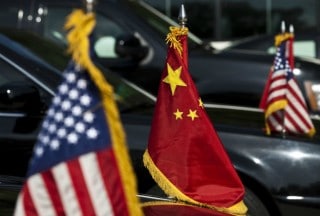 The USA did not help China in any way. After the fall of the Qing in 1919 the USA supported the Kuomintang who robbed the people and country blind, and fought against Mao Zhedong as much as they fought the Japanese. After the Kuomintang lost and fled to Taiwan, the USA invited them to the UNSC instead of mainland China who had the bulk of the Chinese people. Furthermore, the USA was part of a western quartet including France, Britain and Germany that tried to partition China into ‘protectorates’ as the Qing Dynasty was falling, this entire period being referred to by the Chinese as ‘The Century of Shame’.
The USA did not help China in any way. After the fall of the Qing in 1919 the USA supported the Kuomintang who robbed the people and country blind, and fought against Mao Zhedong as much as they fought the Japanese. After the Kuomintang lost and fled to Taiwan, the USA invited them to the UNSC instead of mainland China who had the bulk of the Chinese people. Furthermore, the USA was part of a western quartet including France, Britain and Germany that tried to partition China into ‘protectorates’ as the Qing Dynasty was falling, this entire period being referred to by the Chinese as ‘The Century of Shame’.
During the Korean War, MacArthur was warned about heading north of the 38th parallel but he didn’t listen and the moment he stepped over, three Chinese armies headed south and pushed him back – the first time in a century that an eastern army had strategically defeated a western. The US pattern repeated itself when China retook Tibet, a province that had been sundered from China by the stroke of a British diplomats pen in an illegal treaty. After supporting Communist China at first, the Dalai Lhama discovered that China was going to end the indebted servitude of the Tibetan people, so the US CIA paid the Dali Lhama to try to split Tibet away from China by force of arms – more than once I may add.
During the 1960’s border war between India and China, after India made a preemptive strike against China the USA promptly armed India. After the Indian army was defeated the USA pilloried China as the aggressor even though China did not retain the conquered territory, nor keep any of the captured weapons, and had been attacked without provocation. The author may think the Chinese are stupid — but their racial memories are longer than forever.
2) Abandoning Taiwan will remove the biggest obstacle to Sino-American relations. Since 2003, when President Bush publicly chided then-Taiwanese President Chen Shui-bian on the White House lawn with Chinese Premier Wen Jiabao at his side, the United States has been gradually severing its close links with Taiwan. President Obama’s Taiwan policy has been the logical dénouement. Arms sales have been stalled, no Cabinet members have visited Taiwan since the Clinton years, and trade talks are nonexistent: there is essentially nothing on the U.S.-Taiwan policy agenda. The reaction from China? Indeed, it has moved on. But rather than bask in the recent warming of its relationship with Taiwan, China has picked fights with Vietnam, the Philippines, Japan, South Korea, and India. It does not matter what “obstacles” the United States removes, China’s foreign policy has its own internal logic that is hard for the United States to “shape.” Abandoning Taiwan for the sake of better relations is yet another dangerous fantasy.
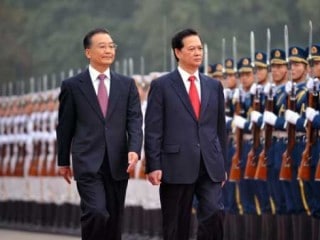
China fought a border war with VietNam in 1970’s http://en.wikipedia.org/wiki/Sino-Vietnamese_War The Vietnamese remember China’s first invasion in the 900AD and subsequently, but they largely forgave these after receiving Chinese assistance against the USA in the 1960’s – this 1970’s war, discussed with and agreed by Kissinger prior, flared the tensions up all over again. Furthermore, the author mentions Chinese stirring up trouble with the Philippines, Japan, South Korea, and India.
Please note that with the exception of India, these nations that China has been having trouble with have a US Military presence – did I mention the USA airlifted arms to India during the border war that India started with China?
3) China will inevitably overtake the U.S. and we must manage our decline elegantly. This is a new China policy unicorn. Until a few years ago, most analysts were certain there was no need to worry about China. The new intellectual fad tells us there is nothing we can do about China. Its rise and our decline are inevitable. But inevitability in international affairs should remain the preserve of rigid ideological theorists who still cannot explain why a unified Europe has not posed a problem for the United States, why post-war Japan never really challenged U.S. primacy, or why the rising United States and the declining Britain have not gone to war since 1812. The fact is China has tremendous, seemingly insurmountable problems. It has badly misallocated its capital thanks to a distorted financial system characterized by capital controls and a non-market based currency. It may have a debt to GDP ratio as high as 80 percent thanks again to a badly distorted economy. And it has created a demographic nightmare with a shrinking productive population, senior tsunami, and millions of males who will be unmarriageable (see the pioneering work of my colleague Nick Eberstadt). The United States also has big problems. But we are debating them vigorously, know what they are and are now looking to elect the leaders to fix them. China’s political structure does not yet allow for fixing big problems.
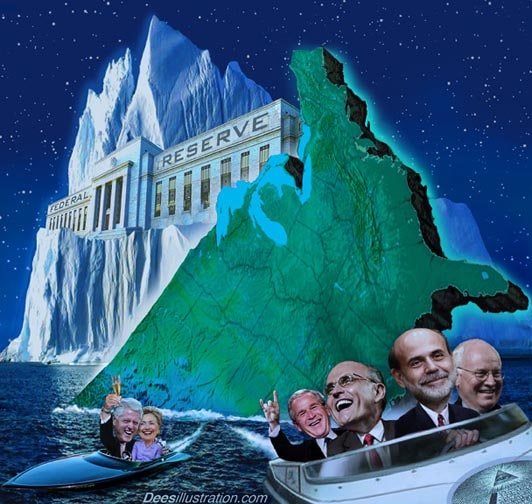
Oh please! Chinese political policy is based on Chinese culture, and the Chinese Politburo has a stable membership that allows them to plan, coordinate and carry their plans to fruition. The one child policy has allowed them to create a stable society that does not depend on outside food sources – a strategic decision – and now that the population is stabilizing at a sustainable level the one child policy is being relaxed. The Chinese have a stable banking sector that is government owned, ie a sovereign currency, therefore most Chinese money is owed to, well, the Chinese! China is run by scientists and engineers at the supreme council level, the USA has politicians, lawyers, and banksters.
4) (Related to 3). China is our banker. We cannot anger our banker. In fact, China is more like a depositor. It deposits money in U.S. treasuries because its economy does not allow investors to put it elsewhere. There is nothing else it can do with its surpluses unless it changes its financial system radically (see above). It makes a pittance on its deposits. If the U.S. starts to bring down its debts and deficits China will have even fewer options. China is desperate for U.S. investment, U.S. treasuries, and the U.S. market. The balance of leverage leans towards the United States.
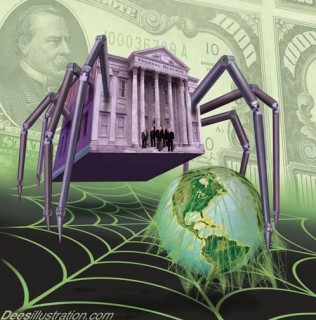
Hard currency is a strategic resource – a doomsday weapon should the US go to war – release it and destroy the US Dollar value. But right now China is using their USD reserves to buy hard commodities, land and companies across the globe.
Those USD are being invested into countries that are having debt problems in a long term strategy to boost cooperation after the US economy has collapsed.
The Chinese choice is simple, with the USD losing value rapidly, the Chinese are divesting of this currency as quickly as possible.
5) We are engaging China. This is a surprising policy unicorn. After all, we do have an engagement policy with China. But we are only engaging a small slice of China: the Chinese Communist Party (CCP). The party may be large — the largest in the world (it could have some 70 million members). We do need to engage party leaders on matters of high politics and high finance, but China has at least one billion other people. Many are decidedly not part of the CCP. They are lawyers, activists, religious leaders, artists, intellectuals, and entrepreneurs. Most would rather the CCP go quietly into the night. We do not engage them. Our presidents tend to avoid making their Chinese counterparts uncomfortable by insisting on speaking to a real cross section of Chinese society. Engagement seen through the prism of government-to- government relations keeps us from engaging with the broader Chinese public. Chinese officials come to the United States and meet with whomever they want (usually in carefully controlled settings, and often with groups who are critical of the U.S. government and very friendly to the Chinese government). U.S. leaders are far more cautious in choosing with whom to meet in China. We do not demand reciprocity in meeting with real civil society — underground church leaders, political reformers and so on. China has a successful engagement policy. We do not.
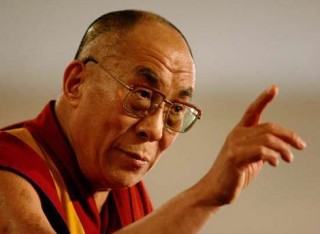 China knows who funds the World Uighur Congress and it isn’t Mother Theresa, check out the location of their world headquarters and their alignment. China knows who sold Opium in the 1800’s and what it was intended to do; did anyone read the story of that British fellow recently executed for running heroin into Xinjiang? Odds are he was being handled by MI6 as somehow, Britain was unable to provide the Chinese government with the medical records that would have saved his life! China saw what the missionaries tried in the 1860’s and how they worked to destroy China’s culture.
China knows who funds the World Uighur Congress and it isn’t Mother Theresa, check out the location of their world headquarters and their alignment. China knows who sold Opium in the 1800’s and what it was intended to do; did anyone read the story of that British fellow recently executed for running heroin into Xinjiang? Odds are he was being handled by MI6 as somehow, Britain was unable to provide the Chinese government with the medical records that would have saved his life! China saw what the missionaries tried in the 1860’s and how they worked to destroy China’s culture.
The Dalai Lhama received CIA funding for many years, how many more examples need I say? Falun Gong, ever wondered where their world headquarters are, or how an all encompassing US police force like the FBI somehow fails to stop one of these people showing up whenever Chinese politicians speak? No wonder the Chinese Government tries to shield their citizens from this nonsense! It would be rather like Hu Jintao meeting subversive militia members in Michigan and offering them weapons and training!

6) Our greatest challenge is managing China’s rise. Actually, our greatest challenge will probably be managing China’s long decline. Unless it enacts substantial reforms, China’s growth model may sputter out soon. There is little if nothing it can do about its demographic disaster (will it enact pro-immigration policy?). And its political system is too risk averse and calcified to make any real reforms.
According to what X-SPURT? In my book, X is an unknown factor and a SPURT is a drip under pressure!
What are your politicians in the USA doing to manage your economy as China reaches to new markets in South America, Africa, the Middle East, Europe and Asia?
7) China’s decline will make our lives easier. China’s decline may make the challenge for the United States more difficult for at least a generation. It could play out for a long time even as China grows more aggressive with more lethal weaponry (e.g., what to do with surplus males?). Arguably both Germany and Imperial Japan declined beginning after World War I and continuing through the disaster of World War II. Russia is in decline by all useful metrics. Even so, it invaded a neighbor not too long ago. A declining, nuclear-armed nation with a powerful military can be more problematic than a rising, confident nation.
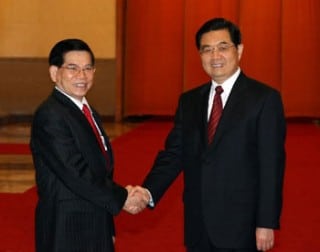 China has never actually invaded a territory in it’s long history unless attacked first; only Chinese cultural assimilates have ever been annexed.
China has never actually invaded a territory in it’s long history unless attacked first; only Chinese cultural assimilates have ever been annexed.
Tibet, the last area annexed, was originally part of Ming China, and had exchanged royal consorts for hundreds of years before that.
The border discussion between Burma and China, and Pakistan and China actually ceded traditional Chinese territory to both these countries in peaceful treaties. China and Vietnam have just recently signed a treaty to conduct peaceful negotiation of their border disputes, and please compare that approach to the US method – “Fifty-Four Forty or Fight!”
8) We need to extricate ourselves from the “distractions” of the Middle East and South Asia to focus on China. This is a very popular unicorn among the cognoscenti. But how would this work? As Middle Easterners go through a historic revolution that could lead to the flowering of democracy or the turmoil of more extremism, how do we turn our attention elsewhere? Are we supposed to leave Afghanistan to the not-so-tender mercies of the Taliban and Pakistani intelligence? This view is particularly ironic given China’s increased interests in the Middle East and our need for a partnership with India to deal with China. There is no way to create the kind of order we wish to see in Asia without exerting a great amount of influence over the oil producing states in the Middle East and by allowing India to become tied down in a struggle in South Asia. We are the sole superpower, our foreign policy is interconnected. “Getting Asia right” means “getting the Middle East and South Asia right.”
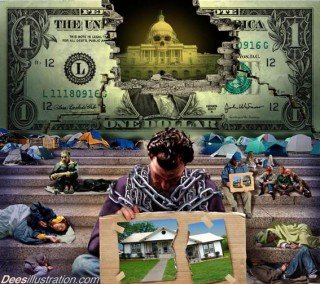 You mean because the USA developed their country so well? Look, it’s simple, go home and produce the perfect country – if it’s perfect, the whole world will want to copy it and you don’t need to export ‘freedom and democracy’ at gun and bayonet point anymore!
You mean because the USA developed their country so well? Look, it’s simple, go home and produce the perfect country – if it’s perfect, the whole world will want to copy it and you don’t need to export ‘freedom and democracy’ at gun and bayonet point anymore!
The world is rejecting the US approach because it doesn’t want it; your own people don’t want it for pity’s sake! The world doesn’t want the US approach because it has been proven to be dysfunctional! Look at this nonsense espoused above – the US needs India to ‘deal with China’? Perhaps if the USA hadn’t backed the losing side, then compounded error on error in bad judgment by shipping arms to India over what was a regional spat you wouldn’t be in this situation, and who said that ‘Asia’ as a group wants to see the ‘order’ that the US wants to see?
Can you say ‘Imperial Hubris’?
9) We need China’s help to solve global problems. This is further down on my list because it is not really a fantastical unicorn. It is true. What is a fantasy is that China will be helpful. We do need China to disarm North Korea. They do not want to, and North Korea is now a nuclear power. The same may soon be true with Iran. The best we can get in our diplomacy with China is to stop Beijing from being less helpful. It is a fact that the global problems would be easier to manage with Chinese help. However, China actually contributing to global order is a unicorn.
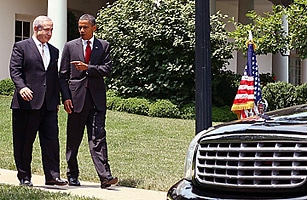
So the USA has to ‘solve’ the problems that the USA was a huge factor in creating – why? USA go home, stop interfering in Korean Affairs and the North Korea problem will solve itself. It was fear of the US invading North Korea that led them to the nuclear bomb. Don’t forget the USA disenfranchised a South Korean socialist government after WWII to place a dictator in place and that was a spark for the Korean war, but better yet, why not take a referendum and see if the Korean People themselves want the US base there – now that’s democracy in action!
When the USA and Britain destroyed Mossadegh’s government in Iran and imposed the Shah you pretty much got what you payed for! Iran remembers the SAVAK, the dead and tortured innocent civilians. So here’s a different idea, pay goods or money for Iranian oil, recognize the government, stop interfering and paying off revolutionaries, and stop threatening Iran. Problem solved!
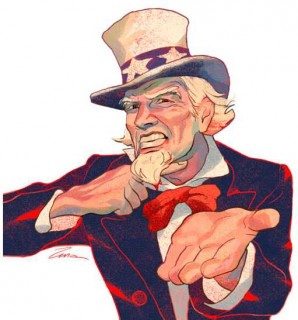
10) Conflict with China is inevitable. A fair reading of the nine “unicorns” above may lead to the conclusion that we are destined to go to war with China. It may be a fair reading, but it is also an inaccurate one. Sino-American relations will be determined by two main drivers; one we can control, the other we cannot. The first is our ability to deter aggressive Chinese behavior. The second is how politics develop in China. The strategic prize for Washington is democratic reform in China. Democracy will not solve all Sino-American problems. China may be very prickly about sovereignty and very nationalistic. But a true liberal democracy in China in which people are fairly represented is our best hope for peace. The disenfranchised could force their government to focus resources on their manifold problems (corruption, misallocated resources, lack of social safety net). The United States and the rest of Asia will certainly trust an open and transparent China more, and ties would blossom at the level of civil society. Historically, the United States has almost always been on China’s side. It is waiting patiently to do so again.
Final notes, the Chinese never invaded Iraq on false pretenses, did not run Abu Ghraib torture prison, never invaded Afghanistan for an oil pipeline and have no troops stationed in foreign countries. The Chinese never needlessly dropped a nuclear bomb, did not participate in bombing Libya, nor is their defense spending anywhere near the USA’s. From those statements, my interpretation is that ‘democracies’ are inherently evil and we need more countries to become a Peoples Republic like China to avoid further war and bloodshed.
In closing my only comment has to be this; unlike robots, people can still be made by unskilled labour and the article offered by Mr. Blumenthal in FP is certainly evidence of shoddy workmanship. If he is any example of what US leaders consider strategic thinking, it’s no longer ‘God Bless the USA’, it’s ‘God Help the USA!’.
ABOUT THE AUTHOR: Jack JC, is a reserve Officer in a NATO aligned country, he has a Bachelors Degree in Mechanical Engineering and an interest in the strategic effects history and culture bring to present geo-political affairs. As an international travelor he has friends and family serving in both NATO and non-NATO countries and would prefer that his friends and family in both camps not kill each other. He has operated at senior corporate levels of management, and has developed equipment for both civilian and military use.
Jack JC, is a reserve Officer in a NATO aligned country, he has a Bachelors Degree in Mechanical Engineering and an interest in the strategic effects history and culture bring to present geo-political affairs. As an international traveler he has friends and family serving in both NATO and non-NATO countries and would prefer that his friends and family in both camps not kill each other. He has operated at senior corporate levels of management, and has developed equipment for both civilian and military use.
ATTENTION READERS
We See The World From All Sides and Want YOU To Be Fully InformedIn fact, intentional disinformation is a disgraceful scourge in media today. So to assuage any possible errant incorrect information posted herein, we strongly encourage you to seek corroboration from other non-VT sources before forming an educated opinion.
About VT - Policies & Disclosures - Comment Policy

